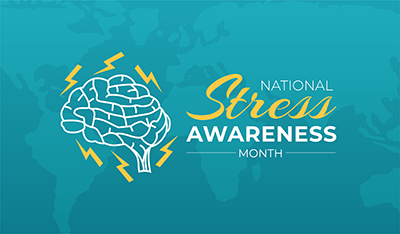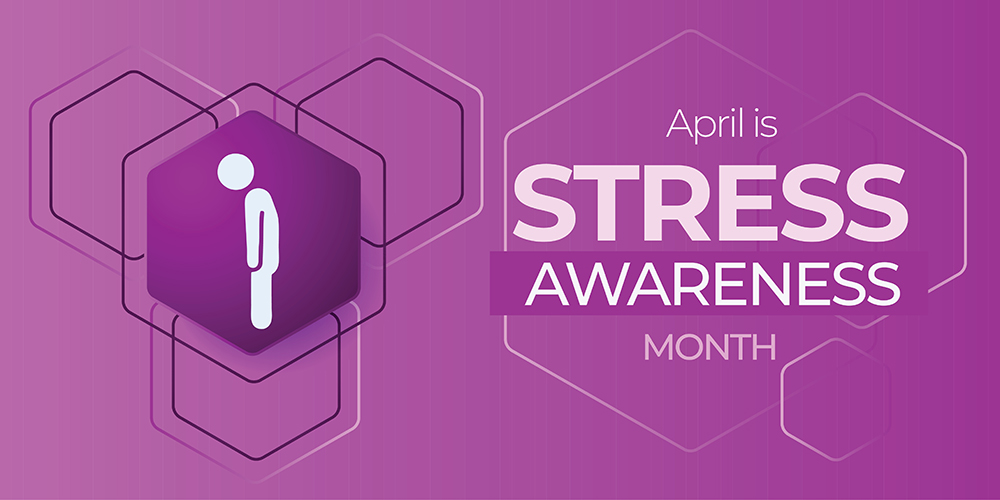
April is National Stress Awareness Month, which was established in 1992 and is sponsored by the Health Resource Network (HRN) in the United States. The goal of this month is to raise awareness about the effects of stress on people’s lives, health, and well-being. An individual’s physical and mental health can suffer as a result of stress, which can lead to a variety of health issues such as anxiety, depression, heart disease, and other chronic illnesses. As a result, this month is an excellent opportunity to educate people about the causes and effects of stress, as well as how to manage and reduce it.
The world is full of challenges and uncertainties, which can cause stress in our everyday lives. Work, school, relationships, financial issues, and health concerns can all cause stress. While some stress is normal in life, excessive and long-term stress can cause serious health problems. As a result, it is critical to recognize the signs of stress and take steps to manage and reduce it.
About Stress
Stress is a natural part of life that everyone experiences at some point. However, chronic or intense stress can be harmful to the body. When we feel stressed, our bodies’ natural “fight or flight” response kicks in. Stress hormones like adrenaline and cortisol are released as part of this response to help the body deal with a threat. While this response is beneficial in short bursts, chronic stress can cause the body to remain in a state of “fight or flight,” which can have long-term consequences.
An increase in blood pressure is one of the most common side effects of stress on the body. This is because stress hormones cause the heart to beat faster and harder, which can raise blood pressure over time. Chronic stress can also compromise the immune system, making it more difficult for the body to fight infections and illnesses. This can increase the risk of illness and disease.
Stress can also have an impact on the digestive system. When stress hormones are released, the body’s natural digestion process is slowed, which can result in digestive problems like constipation, diarrhea, or stomach cramps. Chronic stress can also cause appetite changes and weight gain or loss.
In addition to physical effects, stress can also have negative effects on mental health. Chronic stress can cause anxiety and depression, making it difficult to focus, sleep, and complete daily tasks. It can also cause irritability and mood swings, which can have an impact on personal and professional relationships.
Managing Stress
Adopting healthy lifestyle habits, such as regular exercise, a balanced diet, getting enough sleep, and practicing relaxation techniques, is one of the most effective ways to manage stress. These practices can help improve physical health and overall well-being, as well as lower stress levels. Furthermore, seeking professional help from a therapist or counselor can be beneficial for stress management because they can provide valuable guidance and support.
How to Observe Stress Awareness Month
This month can be observed in a variety of ways, all of which contribute to the goal of lowering levels of stress. Listed below are some ideas to consider:
-
- Learn about stress: Take some time to educate yourself on what stress is and how it affects the body. Read articles or watch videos online that provide information about stress management techniques.
-
- Practice mindfulness: Mindfulness is a practice that involves being present in the moment and paying attention to your thoughts and feelings without judgment. Practicing mindfulness can help reduce stress levels by bringing awareness to the present moment.
-
- Exercise: Physical activity can be an excellent way to reduce stress levels. It releases endorphins that help boost mood and decrease stress levels.
-
- Connect with others: Social support can be a significant factor in reducing stress levels. Reach out to friends or family members, and make time to connect with them regularly.
-
- Take breaks: It’s essential to take breaks throughout the day, especially when you’re feeling stressed. Take a walk outside or do something enjoyable to take your mind off of stressors.
-
- Get enough sleep: Lack of sleep can contribute to increased stress levels. Make sure you’re getting enough sleep each night, and consider implementing a nighttime routine to help you unwind and relax.
-
- Practice self-care: Take time to do things that bring you joy and help you relax. This could be reading a book, taking a bath, or practicing yoga.
Observing National Stress Awareness Month is a reminder to prioritize self-care and take steps to manage stress levels. By implementing some of these suggestions, you can improve your well-being and reduce stress in your life.
Stress in the Workplace
Raising awareness about stress in the workplace is one of the goals of National Stress Awareness Month. Employee productivity, job satisfaction, and overall well-being can all suffer as a result of work-related stress. Employers can play an important role in reducing workplace stress by promoting a healthy work-life balance, providing stress management programs and resources, and creating a positive work environment.
National Stress Awareness Month is an important initiative that raises awareness about stress and its effects on people’s health and well-being. Understanding the causes and effects of stress, as well as adopting healthy lifestyle habits, allows us to manage and reduce stress levels, leading to a happier and healthier life. Let us use this opportunity to prioritize our mental health and well-being, and encourage others to do the same.
MCR Cares About Your Stress
MCR Health is dedicated to raising stress awareness and providing mental health services. MCR Health, as a leading healthcare provider, understands the importance of good mental health and offers a variety of services to help our patients achieve it. Counseling, therapy, and psychiatric evaluations are among the services available, as are education and resources to help patients manage stress and improve their overall mental health. MCR Health believes that everyone deserves access to high-quality mental health care and is dedicated to providing compassionate, evidence-based treatment to those in need. If you are experiencing stress and would like to learn ways to manage it, please contact us today.

